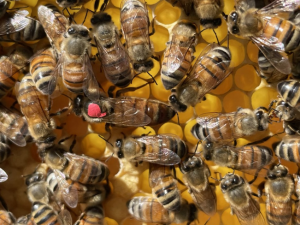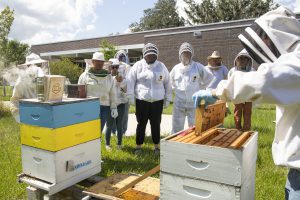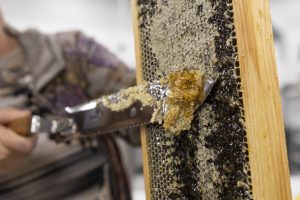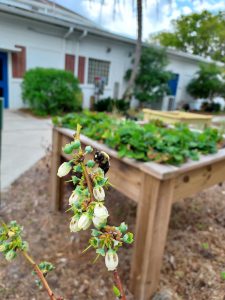Beekeeping is an important aspect of agriculture in Florida and offers numerous opportunities for youth to learn and develop important life skills. By participating in a beginner beekeeping class, youth can develop skills such as communication, decision-making, and responsibility through hands-on experiences with the bees. In addition, they will learn about science, technology, and the environment as they care for the hives and observe the behavior of the bees. These experiences not only provide a unique learning opportunity but also help young people develop critical life skills that will serve them well in their personal and professional lives.
Beekeeping is not only a valuable hobby, but it can also be a fulfilling career. Those who have developed a passion for

beekeeping can consider a career in honey production, queen breeding, or even becoming a professional beekeeper. Beekeeping offers the opportunity to work outdoors and be part of the growing agricultural industry, while also positively impacting the environment by helping to pollinate crops. The hands-on experience and knowledge gained through a beginner beekeeping workshop can provide a solid foundation for those interested in pursuing a career in the field. Whether a hobby or a career, beekeeping provides a unique and rewarding experience that helps individuals develop important life skills while also supporting the local community and environment.
The Importance of Beekeeping in Florida’s Agriculture and Environment
The movement of pollen from the anthers of a flower (Male part of the flower) to the stigma (female part of the flower) of a flower, is called pollination. Pollination is how many plants reproduce and they need the help of animals and insects known as pollinators to achieve this goal. Pollinators can include mammals such as bats, birds, and other animals, but insects and other arthropods are the most common pollinators. Among these insects, we found the western honeybee.
The western honeybee is one of 300 bee pollinator species occurring in Florida. Although they are not the only pollinators in the state, these bees are credited approximately for 85% of the pollination of all crops in Florida. This means that without western honeybee agriculture as we know it wouldn’t exist. The western honeybees also help to pollinate many ornamental plants on landscapes and other plants in natural areas.

In Florida we have over 3,000 registered beekeepers, managing a total of approximately 400,000 honeybee colonies and producing over 10 – 20 million pounds of honey. According to USDA Statistics Florida is the number 4 state with honey-producing colonies and within the first 10 states in honey production. Beekeepers in Florida provide pollination services to crops including strawberries, blueberries, watermelons, and other important crops of the state. Since Florida have a subtropical climate, the state is part of the honey flow, meaning that many beekeepers from colder states travel to Florida during the wintertime for their beekeeping business. For these reasons, beekeeping is extremely important in the state of Florida.
Beekeeping can provide numerous amounts of products including:
Honey: this substance derives from the nectar gathered by the bees during the pollination process. Once a bee returns to the hive, she will start regurgitating the nectar from bee to bee. During this process, each bee adds enzymes to the nectar until one bee deposit the nectar into a hive cell. Later other bees are going to dry out this substance and cap it, converting the nectar into honey. Depending on the flower where the nectar was gathered, the flavor and color of the honey will vary. Honey can be sold as raw honey, processed honey, and with or without a honeycomb. Honey can be used as a nutritious food, for medicinal purposes, or for mead and other honey drinks. For information about how to legally sell honey in Florida click here.

Beeswax: This substance is produced by honeybees and is used to build comb for brood (eggs, larvae, and pupae), and for honey and pollen storage. Today beeswax is mostly used to produce candles, but it can also be used for pharmaceuticals and cosmetic products, as a sealing agent, for art purposes, and as cheese coatings. For information about beeswax rendering click here.
Pollen: The pollen gathered by bees during the pollination process can be used as nutritious food for humans.
Propolis: This is a sticky resinous substance honeybees collect for conifer plants that they used to seal their hives. Propolis has antibacterial and antifungal properties that bees use to protect the hive. For this reason, propolis is used as a natural supplement in natural medicines.
Royal jelly: This substance is secreted by worker bees (between the ages of 5 days-15 days) and fed to larvae for the first 3 days after hatching. The bees that will become queen bees are fed royal jelly for the rest of their lives. Today royal jelly is used as an ingredient in creams, moisturizers, and as a supplement in healthy foods.
Bee venom: Bee venom has been used in alternative therapy collected as a venom extract to be injected or directly administered by bee stings, for arthritis treatment for many years. It has been also used in alternative therapy for sclerosis, tendonitis, and fibromyalgia treatments. These applications should be performed by trained professionals.
Beekeeping is not just for commercial purposes. Homeowners can also keep their bees in their backyard as a hobby or to help pollinate their vegetable gardens or ornamental plants. It is always important to look for local regulations before bringing bees into your property. Check for property zoning, local city regulations, and HOA rules. Florida Department of Agriculture and Consumer Services (FDCAS) regulates registered beekeepers throughout the state. Even if you are keeping bees for non-commercial purposes, FDACS will still require you to be a registered beekeeper. To learn more about the Florida registration process, visit the FDACS Beekeeper Registration website.

Come join us at the UF/IFAS Extension Polk County office for an informative Basic Beekeeping Workshop for youth ages 14 to 18! On March 14, 2023, from 9:00 am to 2:30 pm, we will cover everything you need to know about the western honey bee and beekeeping. From beekeeping laws and regulations to the biology of honey bees, pests and diseases, and the tools you’ll need to get started, this workshop will provide a comprehensive introduction to the world of bees. You’ll even get to see a live demonstration of a hive and learn about the many career opportunities in beekeeping. Our office is located at 1702 S Holland Pkwy, Bartow, FL 33830. Don’t miss this chance to learn about the important role bees play in agriculture and the environment!
Registration is through 4-H online: https://v2.4honline.com/#/user/sign-in
For more information About the Western Honey Bee or other pollinators access the following “Ask IFAS” publications:
EUROPEAN HONEY BEE APIS MELLIFERA LINNAEUS AND SUBSPECIES (INSECTA: HYMENOPTERA: APIDAE)
DIFFERENCES BETWEEN EUROPEAN AND AFRICAN HONEY BEES
ATTRACTING NATIVE BEES TO YOUR FLORIDA LANDSCAPE
For 4-H activities involving beekeeping, click here.
University of Florida is an Equal Opportunity Institution
 1
1
